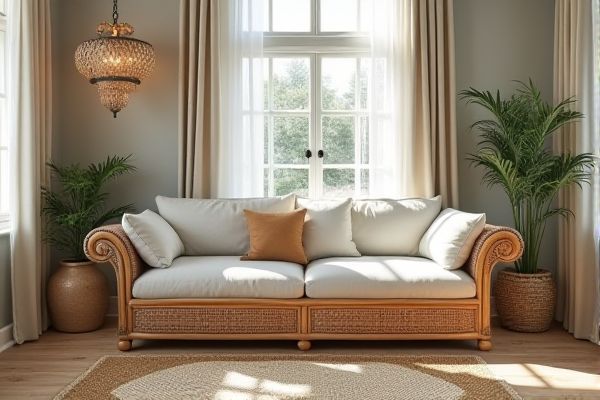
Resin wicker offers superior durability, weather resistance, and low maintenance compared to natural wicker, which is prone to fading and damage from moisture and UV exposure. Discover which material suits Your outdoor furniture needs best by exploring the detailed comparison in the rest of the article.
Table of Comparison
| Feature | Resin Wicker | Natural Wicker |
|---|---|---|
| Material | Synthetic resin (PE or PVC) | Natural plant fibers (rattan, bamboo, reed) |
| Durability | Highly durable, weather-resistant, UV-resistant | Less durable, prone to fading and cracking outdoors |
| Maintenance | Low maintenance; easy to clean with soap and water | Requires regular cleaning and treatment to prevent damage |
| Appearance | Consistent color and texture, modern look | Natural, rustic look with unique variations |
| Environmental Impact | Less eco-friendly; made from synthetic materials | Eco-friendly; biodegradable and renewable resource |
| Cost | Moderate to high due to durability | Generally lower, but varies by quality |
| Usage | Ideal for outdoor furniture and harsh weather | Best suited for indoor or covered outdoor use |
Introduction to Resin Wicker and Natural Wicker
Resin wicker consists of synthetic fibers crafted from polyethylene, designed to mimic the appearance and texture of natural wicker while offering enhanced durability and weather resistance. Natural wicker is made from plant-based materials such as rattan, willow, or bamboo, providing a classic, organic aesthetic but requiring more maintenance due to its sensitivity to moisture and sunlight. Your choice between resin wicker and natural wicker depends on factors like outdoor exposure, desired longevity, and maintenance preferences.
Understanding the Materials: What is Wicker?
Wicker refers to the weaving technique used to create furniture and decor items from pliable plant-based or synthetic materials. Natural wicker is typically made from organic fibers like rattan, bamboo, or willow, offering authentic texture and eco-friendliness but requiring more maintenance. Resin wicker, crafted from polyethylene or other synthetic fibers, provides enhanced durability, weather resistance, and low upkeep, making it a practical choice for outdoor furniture that maintains the woven aesthetic.
Resin Wicker: Features and Benefits
Resin wicker, crafted from synthetic polyethylene fibers, offers superior durability and resistance to UV rays, moisture, and temperature fluctuations compared to natural wicker. Its low-maintenance properties prevent fading, cracking, and mold growth, making it ideal for outdoor furniture in diverse climate conditions. The material is lightweight yet sturdy, providing long-lasting comfort and aesthetic appeal without the need for frequent upkeep.
Natural Wicker: Features and Benefits
Natural wicker showcases organic materials like rattan, bamboo, or willow, offering unique texture and authentic beauty that enhances outdoor or indoor spaces. Its eco-friendly nature and breathable weave provide comfort and sustainability, making it a preferred choice for those valuing natural aesthetics. Choosing natural wicker ensures your furniture blends seamlessly with nature while delivering durability and timeless elegance.
Durability: Resin Wicker vs Natural Wicker
Resin wicker offers superior durability compared to natural wicker, as it resists moisture, UV rays, and temperature fluctuations, preventing cracking and fading over time. Natural wicker, made from plant fibers like rattan or bamboo, tends to be more susceptible to weather damage, mold, and fraying, requiring more careful maintenance. Choosing resin wicker ensures your outdoor furniture remains resilient and visually appealing through various environmental conditions.
Maintenance Requirements
Resin wicker requires minimal maintenance compared to natural wicker, as it is resistant to moisture, UV rays, and fading, making it ideal for outdoor use. Natural wicker demands regular cleaning and protection from excessive moisture and sunlight to prevent mold, cracking, or discoloration. Choosing resin wicker can save you time and effort in upkeep, ensuring your furniture retains its appearance with less worry.
Weather Resistance and Outdoor Use
Resin wicker outperforms natural wicker in weather resistance, as it is made from synthetic materials designed to withstand rain, UV rays, and temperature fluctuations without fading or cracking. Natural wicker, typically crafted from rattan or cane, is more susceptible to moisture damage, mold, and brittleness when exposed to outdoor conditions over time. For durable outdoor furniture, your best option is resin wicker, ensuring longevity and minimal maintenance despite exposure to harsh weather elements.
Aesthetic Differences and Design Options
Resin wicker offers a sleek, uniform appearance available in diverse colors and finishes, making it ideal for contemporary and customizable outdoor furniture designs. Natural wicker boasts a warm, organic texture with unique variations that enhance traditional and rustic aesthetics. Both materials provide distinct design options, where resin wicker excels in durability for modern styles while natural wicker emphasizes handcrafted elegance and natural beauty.
Cost Comparison
Resin wicker typically costs more upfront than natural wicker due to its durable, weather-resistant synthetic fibers designed for longevity and low maintenance. Natural wicker, made from organic materials like rattan or bamboo, is generally less expensive initially but may incur higher replacement or maintenance costs over time because of its susceptibility to moisture and UV damage. Considering lifecycle costs, resin wicker offers better value for outdoor furniture investments by minimizing repair and replacement needs.
Which Wicker is Best for You?
Resin wicker offers superior durability, weather resistance, and low maintenance, making it ideal for outdoor furniture that withstands rain, sun, and humidity. Natural wicker provides a classic, organic look and a lightweight feel but requires protection from moisture and sunlight to prevent damage. Your choice depends on whether you prioritize long-lasting performance with minimal upkeep (resin) or a traditional aesthetic with more careful care (natural).
 homyna.com
homyna.com